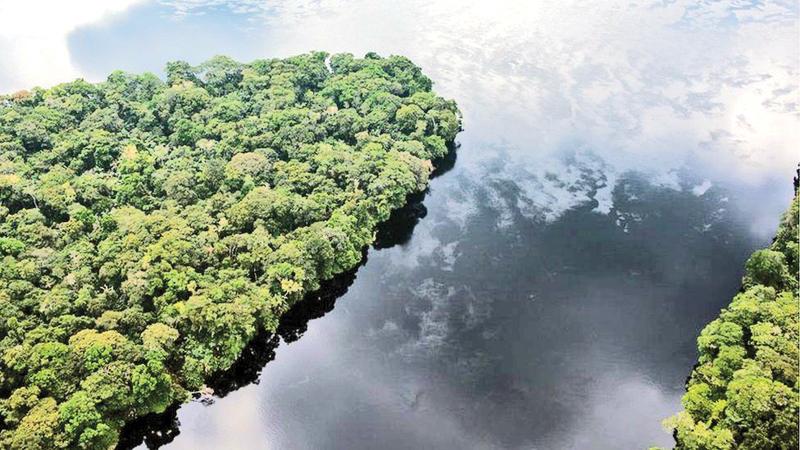
A giant slab of carbon-rich peat, discovered in central Africa, is under threat from uncontrolled development - posing a significant risk for future climate change, writes BBC Africa correspondent Andrew Harding.
After 10 hours by car, another 10 by river in a dugout canoe, three hours hacking a path with machetes through thick tropical undergrowth, then another two wading and clambering through a sweltering forest swamp, the scientists were finally ready to begin work.
Brushing away mud and mosquitos, they assembled a long, metal, corkscrew-like device, and thrust it deep into a patch of dark, water-logged earth.
“Push. Again,” said Greta Dargie, the British scientist leading the group, as she and two Congolese colleagues twisted and pushed the rod further into the ground, then pulled out a half-metre cylinder of shiny black peat.
“Not bad at all,” said Jodrhy Matoko, a doctoral student from Marien N’Gouabi University in Congo-Brazzaville.
Over the past decade, the close-knit team has spent months at a time camping in the remote swamps that border the giant Congo river, watching out for crocodiles, snakes and lowland gorillas - and mapping the contours of a giant slab of carbon-rich peat, which they now believe could cover an area significantly larger than England.
Adventure
“We really want to fill in the blanks on the map. It’s hard work. But it’s always an adventure. I’ve been doing it for 10 years now, so I must like it,” said Dr Dargie, a quietly determined peat expert from the UK’s University of Leeds.
Matoko was more effusive: “I’m a forest man. It’s a very relaxing place. No stress here.”
The scientists - mapping each spot with a GPS monitor - photographed the peat cores, then sealed them in plastic to send off to Leeds University for further analysis.
“This peat is so important in the context of climate change. We have a very large amount - some 30 billion tonnes - of carbon stored here. And if it is released into the atmosphere it is going to accelerate global change,” said Suspense Ifo, Congo-Brazzaville’s leading expert on the peatlands, who was visiting the team.
“That’s about 20 years of US fossil fuel emissions. I think these ecosystems aren’t yet valued as they should be at the international level. [The Congo-Brazzaville government] needs the international community to support them financially to ensure these peatlands remain protected,” said Dr Dargie.
The peatlands hold far more carbon than the vast forests in which they are found. But the peat, which has taken thousands of years to build up, can be destroyed within a matter of weeks if allowed to dry out.
The main threats come from longer dry seasons, linked to climate change, and from man-made actions like unsustainable farming practices - a serious challenge as Congo-Brazzaville and its neighbours seek to develop their economies and adapt to growing populations.
A more recent concern is the possibility of significant oil deposits being confirmed and exploited, close to the peatlands.
Congo-Brazzaville’s government has already begun parcelling out blocks of land and looking for potential investors, although there is some uncertainty about the extent and significance of the oil reserves.
Natural resources
“You can’t ask us to keep our natural resources under wraps. If we need to exploit them, we shall exploit them, in a sustainable way and in accordance with environmental rules,” said Congo-Brazzaville’s Environment Minister Arlette Soudan-Nonault, dismissing concerns about corruption and mismanagement.
–BBC
